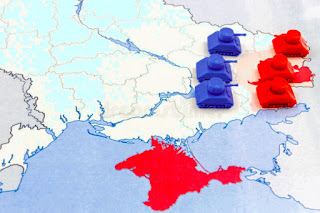OECD Interim Economic Outlook warns of pervasive global economic slowdown
"The global economy has lost momentum in the wake of Russia’s unprovoked, unjustifiable and illegal war of aggression against Ukraine..."
The global economy has lost momentum in the wake of Russia’s war of aggression in Ukraine, which is dragging down growth and putting additional upward pressure on inflation worldwide, according to the OECD’s latest Interim Economic Outlook.
The Outlook projects global growth at a modest 3% this year before slowing further to just 2.2% in 2023. This is well below the pace of economic growth projected prior to the war and represents around USD 2.8 trillion in foregone global output in 2023.
The inflation and energy supply shock stemming from the war has led the OECD to revise its previous growth projections downward worldwide. Annual GDP growth is projected to slow to around 1/2% in the United States in 2023, and 1/4% in the euro area, with risks of deeper declines in several European economies during the winter months. Growth in China has also been hit and is expected to drop to a projected 3.2% in 2022. Except the 2020 pandemic, this will be the lowest growth rate in China since the 1970s.
Inflation is projected to recede gradually through 2023 in most G20 countries as tighter monetary policy takes effect and global growth slows. Headline inflation is projected to ease from 8.2% this year to 6.6% in 2023 in the G20 economies, and fall from 6.2% this year to 4% in 2023 in the G20 advanced economies.
“The global economy has lost momentum in the wake of Russia’s unprovoked, unjustifiable and illegal war of aggression against Ukraine. GDP growth has stalled in many economies and economic indicators point to an extended slowdown,” OECD Secretary-General Mathias Cormann said during a presentation of the Outlook. “Inflationary pressures that were already present as the global economy emerged from the pandemic have been severely aggravated by the war. This has further driven rising energy and food prices that now threaten living standards for people across the globe.”
The OECD points to substantial uncertainty about the economic outlook, with significant downside risks. These include the possibility of further food and energy price spikes, which could push many people into poverty, as well as the possibility of gas shortages as winter progresses in the Northern hemisphere. Reducing energy consumption and diversifying supply sources will be critical to avoid shortages, which would push global energy prices up, damage confidence, and likely worsen financial conditions and require a temporary period of enforced reduction of gas use by businesses.
Taken together, these shocks could reduce growth in the European economies by over 1¼ percentage points in 2023, relative to the Outlook’s central projection, and raise inflation by over 1½ percentage points. This would push many countries into a full year recession in 2023, while GDP growth would also be weakened in 2024.
Other key risks are that the ongoing adjustments in Chinese property markets - combined with the high level of corporate debt in China and continuation of the country’s “zero-Covid” policy - could generate a more severe slowdown in the world’s second largest economy than projected. This risk comes on top of continued costs from global supply chain pressures, and possible debt crises and financial contagion in many emerging-market and low-income economies.
Further monetary policy tightening will be needed in most major economies to ensure that inflation pressures are reduced durably. This will need to be calibrated carefully given uncertainty about the speed at which higher interest rates will take effect and spillovers from tightening in the rest of the world.
Fiscal support can help cushion the impact of high energy costs on households and companies, but should be concentrated on aiding the most vulnerable and preserve incentives to reduce energy consumption. Fiscal actions to cushion living standards must avoid persistent stimulus at a time of high inflation. Means-tested transfers to households broadly meet this criteria.
Managing the energy crisis requires renewed efforts to secure alternative supplies while ensuring all sectors of the economy are incentivised to reduce demand. There is also an urgent need for governments to accelerate investment in energy security and invest in the green transition.
For the full report and more information, visit the Economic Outlook online. Media queries should be directed to the OECD Media Office (+33 1 4524 9700)
26/9/2022



